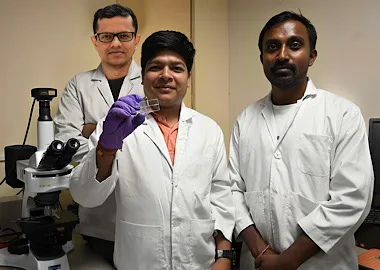Guwahati: Researchers at the Indian Institute of Technology Guwahati (IIT-G) have made a significant breakthrough with a new microfluidic system that mimics soil conditions to improve agricultural productivity. This portable and cost-effective technology has shown that optimizing nutrient flow can enhance root growth and nitrogen uptake, leading to better crop yields.
The pioneering work, led by Prof. Pranab Kumar Mondal from the Department of Mechanical Engineering and the School of Agro and Rural Technology, utilizes microfluidics to explore how plant roots absorb nutrients. By simulating soil-like environments, the team has gained valuable insights into root dynamics, which could revolutionize crop management practices.
Their findings, detailed in the journal Lab on a Chip, reveal that controlled nutrient flow can significantly boost root length and nitrogen uptake. However, the study also highlights that excessive flow can stress the roots, reducing their growth. This research, supported by the Science and Engineering Research Board (SERB/ANRF) of the Government of India, demonstrates the potential for improved nutrient delivery in agricultural systems.
“The study offers new perspectives on plant root behavior through advanced microfluidic devices,” said Prof. Mondal. “Our setup not only simulates nutrient flow but also measures its impact on root development, providing insights with practical implications for farming.”
The team’s work focuses on the high-yielding mustard variety, Pusa Jai Kisan, known for its efficient root diameter. By optimizing nutrient conditions, the research aims to enhance soil-less crop production and improve hydroponic systems.
Future plans include exploring the molecular mechanisms behind flow-induced root changes, which could lead to more resilient agricultural technologies and support sustainable crop production.



Amazing news , more news are waiting
Brilliant breakthrough!
Science in agriculture can greatly guarantee food security of the nation.